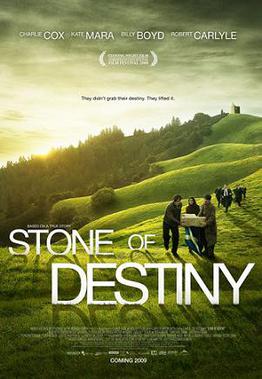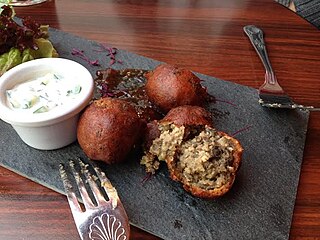
A Burns supper is a celebration of the life and poetry of the poet Robert Burns, the author of many Scots poems. The suppers are normally held on or near the poet's birthday, 25 January, known as Burns Night also called Robert Burns Day or Rabbie Burns Day. However, in principle, celebrations may be held at any other time of the year. Burns suppers are held all around the world.

Cheddar cheese is a natural cheese that is relatively hard, off-white, and sometimes sharp-tasting. It originates from the English village of Cheddar in Somerset, southwest England.

Haggis is a savoury pudding containing sheep's pluck, minced with chopped onion, oatmeal, suet, spices, and salt, mixed with stock, and cooked while traditionally encased in the animal's stomach though now an artificial casing is often used instead. According to the 2001 English edition of the Larousse Gastronomique: "Although its description is not immediately appealing, haggis has an excellent nutty texture and delicious savoury flavour".

A sausage is a type of meat product usually made from ground meat—often pork, beef, or poultry—along with salt, spices and other flavourings. Other ingredients, such as grains or breadcrumbs, may be included as fillers or extenders.

A Scotch egg is a boiled egg wrapped in sausage meat, coated in breadcrumbs and baked or deep-fried.

The Lorne sausage, also known as square sausage or slice, is a traditional Scottish food item made from minced meat, rusk and spices. Although termed a sausage, no casing is used to hold the meat in shape, hence it is usually served as square slices from a formed block. It is a common component of the traditional Scottish breakfast.

Kilchoman distillery is a distillery that produces single malt Scotch whisky on Islay, an island of the Inner Hebrides. Kilchoman Distillery is in the northwest of the island, close to Machir Bay. Kilchoman was founded by Anthony Wills and remains an independent, family run distillery. It is the smallest on the island but since obtaining Rockside Farm in 2015, is in the process of expanding.

Cock-a-leekie soup is a Scottish soup dish consisting of leeks and peppered chicken stock, often thickened with rice, or sometimes barley. The original recipe added prunes during cooking, and traditionalists still garnish with a julienne of prunes.

Scottish cuisine encompasses the cooking styles, traditions and recipes associated with Scotland. It has distinctive attributes and recipes of its own, but also shares much with other British and wider European cuisine as a result of local, regional, and continental influences—both ancient and modern.

Baxters Food Group Limited, also known as Baxters of Speyside or Baxters, is a food processing company, based in Fochabers, Scotland. It produces foods such as canned soups, canned meat products, sour pickles, sauces, vinegars, antipasto, chutneys, fruit preserves and salad and meat condiments.

A full breakfast is a substantial cooked breakfast meal, often served in Great Britain and Ireland. The typical ingredients are bacon, sausages, eggs, black pudding, baked beans, tomatoes, mushrooms, toast, fried bread and a beverage such as coffee or tea. Hash browns are a common contemporary but non-traditional inclusion. Ingredients may extend beyond these or include regional variants, which may often be referred to by different names depending on the area. While it is colloquially known as a "fry-up" in most areas of the United Kingdom and Ireland, it is usually referred to as a "full English", a "full Irish", "full Scottish", "full Welsh", and "Ulster fry", in England, the Republic of Ireland, Scotland, Wales, and Northern Ireland, respectively.

Clapshot is a traditional Scottish dish that originated in Orkney and may be served with haggis, oatcakes, mince, sausages or cold meat. It is created by the combined mashing of swede turnips and potatoes with the addition of chives, butter or dripping, salt and pepper; some versions include onions. The name is Orcadian in origin.

Stone of Destiny is a 2008 Scottish-Canadian historical adventure comedy film written and directed by Charles Martin Smith and starring Charlie Cox, Billy Boyd, Robert Carlyle, and Kate Mara. Based on real events, the film tells the story of the removal of the Stone of Scone from Westminster Abbey. The stone, supposedly the Stone of Jacob over which Scottish monarchs were traditionally crowned at Scone in Perthshire, was taken by King Edward I of England in 1296 and placed under the throne at Westminster Abbey in London. In 1950, a group of Scottish nationalist students succeeded in liberating it from Westminster Abbey and returning it to Scotland where it was placed symbolically at Arbroath Abbey, the site of the signing of the Declaration of Arbroath and an important site in the Scottish nationalist cause.

Fruit pudding is a Scottish dish which is a mixture of wheat or oatmeal flour or breadcrumbs, beef suet, brown sugar, currants, raisins, sultanas, salt and cinnamon, formed into the shape of a large sausage.

Dugald Patterson McDougall Semple was a Scottish advocate of simple living and animal welfare, naturalist, prolific author, and fruitarian. He is sometimes credited with co-founding the vegan movement in 1944 without using the term "vegan".
The idea of drinking whisky with food is considered outré by many, but there is a growing interest in pairing whiskies with complementary foods. The Scotch whisky industry has been keen to promote this. Single malts, pot-still whiskies, bourbons, and rye whiskies offer an interesting range of tastes and aromas, which are just as varied as wine. Jake Wallis Simons compares whiskies in bourbon casks to white wines, due to their lighter flavor, and those in sherry casks to red wines, with their greater fruitiness. A few Scottish cook books contain reference to the use of whisky in cooking, and a few traditional Scottish recipes that use whisky exist.

The Accomplisht Cook is an English cookery book published by the professional cook Robert May in 1660, and the first to group recipes logically into 24 sections. It was much the largest cookery book in England up to that time, providing numerous recipes for boiling, roasting, and frying meat, and others for salads, puddings, sauces, and baking. Eight of the sections are devoted to fish, with separate sections for carp, pike, salmon, sturgeon, and shellfish. Another section covers only eggs; and the next only artichokes.
John Angus Macsween was a Scottish butcher and entrepreneur who helped popularise haggis as an international dish.

Haggis pakora is a Scottish snack food that combines traditional Scottish haggis ingredients with the spices, batter and preparation method of Indian and Pakistani pakoras. It has become a popular food in Indian and Pakistani restaurants in Scotland, and is also available in prepared form in supermarkets.

A meat-free sausage roll is a savoury pastry snack that contains a non-meat filling. The snack is an alternative to the conventional sausage roll that generally contains pork or beef. Meat-free sausage rolls are sold at retail outlets and are also available from bakeries as a take-away food.




















